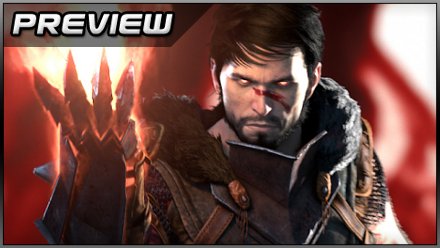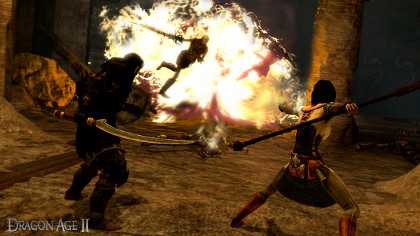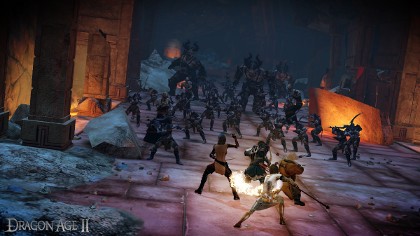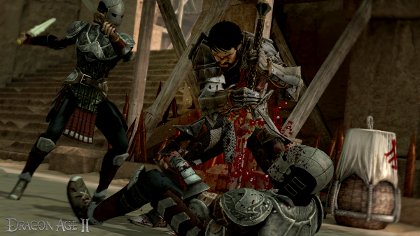
Dragon Age II spins a good yarn. Several, actually. In a reflexive twist, BioWare’s latest attempt to press banknotes from chunkily rendered orc-flesh makes storytelling a part of its fiction: the new leading man (or woman) is a chap (or chappette) named Hawke, but you’ll step into the shoes of this martial prodigy only via the less-than-trustworthy recollections of old dwarven pal Varric, under questioning by members of the Chantry, principal god-botherers in the cosily generic realm of Ferelden.
It seems another cataclysm is in the offing, and the aforesaid Hawke is the only mega-upgradeable, non-gender-specific hero for hire who can avert it. Hawke beat the stuffing out of the Darkspawn – Dragon Age’s recurrent demonic menace – back in the day, see, and Varric’s interrogator Cassandra is convinced that somewhere in the chronology of said stuffing-beating lies the solution to Ferelden’s present, undivulged troubles.
Varric isn’t overly disposed to throw his captors a bone, however, being less than enamoured of the Chantry and its inquisitorial methods. He treats Cassandra to a dubious account of the final clash which doubles, rather handily, as a playable introduction to the game’s three classes, pitting a powered-up rogue or warrior plus swap-in mage accomplice against waves of dribbling leatherheads.
But Cassandra’s not swallowing any amateur dramatics, expressing her disdain for the exaggerations of history books by impaling one on her dagger. She orders Varric to go back to the beginning, at the height of the first game’s Darkspawn outbreak, when Hawke and his family were just another clump of refugees fleeing the horde.
The mediated, slippery narrative is easily the most intriguing thing about the new Dragon Age, promising to wreak havoc on tired plot devices as Cassandra cross-examines Varric, dissecting his calculatedly patchy memory, sorting fact from fancy. Where the original gave us a labyrinthine but slightly prosaic tale of small-time adventurers rising to world-saving prominence, the new aims to shatter and reformulate the grandiosities of other RPGs from scene to scene, continually scratching beneath the surface of Hawke’s fable. It’s as much a critique of fantasy’s shabbier habits as a fantasy itself, the Spike Jonze of the Dungeons & Dragons milieu.
The gameplay has its competing strands, too, and much like Varric’s sensational war story, some of them are less convincing than others. A baroque, jargon-laden monstrosity in an age of scrubbed-up Facebook sims and levelling online shooters, Dragon Age: Origins was feted by fans of Bioware’s reputation-making Baldur’s Gate series. But in winding back the clock to 1998, the developer struggled to replicate the faster, showier flow of latter-day, console-leaning stat-crunchers, and the result, on Xbox 360 and PS3, was a shonky halfway house – an action game hand-cuffed to an auto-attack, a strategy game hobbled by a third-person view.
Rather than trying to bring about another best of both worlds, BioWare has laboured to make each version of the game its own entity. PC gamers can look forward to more top-down micromanagement in freeze time, the weighing of this cone-effect flame spell against that teleporting backstab, this petrification potion against that acid flask. Console gamers, meanwhile, will find things decidedly more hack ‘n’ slashy. There’s the same breadth and depth of tools and features to either side of the line, but the control and pacing are worlds apart.
Before plunging further into Hawke’s backstory, I’m invited to put my own spin on the bloodied, rugged ’70s porn extra who serves as default male avatar. There’s the usual avalanche of sliders and pigments, letting you tweak everything from nose width to eye colour, but BioWare has sacrificed choice of species in order to better choreograph the plot. That’s the official line, anyway. The development team may simply loathe dwarves and elves, and given the quantities of man-hours they’ve piled into polishing and repolishing those rather tepid racial archetypes, who can blame them?
With a splash of Evans-Thirlwell magic, BioWare’s sharply bearded poster boy develops a receding hairline, obscene arabesque eyeliner and pudgy bronzed cheekbones – a potent mix that clashes horribly with the fine Anglo Saxon features of his mother and siblings. The latter trio will accompany you on your journey from zero to hero, their opinion of their illustrious relative shifting in the wake of key decisions, putting forth new plot threads. In the short term, though, they’ll happily fill in as fire support.
The Hawke clan begins the second flashback at one end of a corridor of dirt basins and crags, recovering their breath after a hasty exit from the village of Lothering – and if you’re looking for a key word for what follows, it’s “body-count”. Darkspawn spill into view like ants from a kicked nest and are just as swiftly dispatched, whether by Hawke’s dual blades (I’m rocking a rogue), the broadsword of his brother Carver or the lightning bolts of wizardly sister Bethany.
Attacks and abilities – like a stunning pommel-bash, or an evasive back-flip – are performed in more-or-less real-time with the face buttons, repeated bludgeoning of which becomes the order of the day. You can still distribute the pain by way of the old item/ability wheel and targeting reticle if you wish, but given the efficacy of relentless button punishment, it’s easy to breeze over the minutiae of tactics. A little too easy, perhaps. At this stage in the proceedings, the feel is more Castle Crashers than Neverwinter Nights.
For a game which leans so heavily on the process of giving the pad a jolly good seeing to, there’s a disappointing lack of physicality to what happens on-screen. Basic blows glide through their targets with all the impact of a mobile phone signal. Knockback, where applicable, is painfully wooden. Though punchier than its predecessor, Dragon Age II still hinges on the mating of arbitrary numbers behind the scenes, and this leaves the battling feeling rather bloodless despite its infantile enthusiasm for gore.
Dialogue is now conducted a la Mass Effect, players rolling an analogue stick towards abbreviated (but fairly transparent) responses. There’s not much interaction of significance to be had in the prelude, but I do derive a certain chilly satisfaction from telling a beat-up Templar couple to hop it, suspecting their intentions towards Bethany (Templars, remember, are Ferelden’s magic policemen). Early speech choices break in three along the same lines as in older BioWare outings: you can play the jerk, the saint or a chin-stroking shade of in-between.
And that last phrase sums up my feelings about this game. Doubling the adrenaline dose would seem a great way of tackling those notoriously fidgety console owners on their own intellectual turf, but in doing so BioWare has thrown open the door to comparisons with the likes of Onimusha or Castlevania, and what we’ve seen just doesn’t cut the mustard. The self-conscious narrative fascinates, and there’s plenty here in terms of features – Enchanted Aluminium Bastard Sword +3s, Chromium Ice-balls of Painingness and whatnot – but the battlefield is where things need, and have yet, to come together.
Dragon Age II is out for PC, Xbox 360, PlayStation 3 and Mac on 8th March in North America in 11th March in Europe. Why not read our interview with BioWare’s Robyn Theberge? Watch out for another one soon!








 Satoru Iwata Video Interview - the late Nintendo president spoke with Kikizo in 2004 as 'Nintendo Revolution' loomed.
Satoru Iwata Video Interview - the late Nintendo president spoke with Kikizo in 2004 as 'Nintendo Revolution' loomed. Kaz Hirai Video Interview - the first of Kikizo's interviews with the man who went on to become global head of Sony.
Kaz Hirai Video Interview - the first of Kikizo's interviews with the man who went on to become global head of Sony. Ed Fries Video Interview - one of Xbox's founders discusses an epic journey from Excel to Xbox.
Ed Fries Video Interview - one of Xbox's founders discusses an epic journey from Excel to Xbox. Yu Suzuki, the Kikizo Interview - we spend time with one of gaming's most revered creators.
Yu Suzuki, the Kikizo Interview - we spend time with one of gaming's most revered creators. Tetris - The Making of an Icon: Alexey Pajitnov and Henk Rogers reveal the fascinating story behind Tetris
Tetris - The Making of an Icon: Alexey Pajitnov and Henk Rogers reveal the fascinating story behind Tetris Rare founders, Chris and Tim Stamper - their only interview? Genuinely 'rare' sit down with founders of the legendary studio.
Rare founders, Chris and Tim Stamper - their only interview? Genuinely 'rare' sit down with founders of the legendary studio. The History of First-Person Shooters - a retrospective, from Maze War to Modern Warfare
The History of First-Person Shooters - a retrospective, from Maze War to Modern Warfare
Finally an unbiased preview. Thanks for that! But i’m going to pass. The first game was epic in everything except combat mechanics and rules IMO and because I’m playing a game that’s what matters the most to me. RPG is not just a good story, it’s also good rules, lore and a bunch of other stuff. If I want a good story, I’ll watch a movie but I want to play a good RPG.